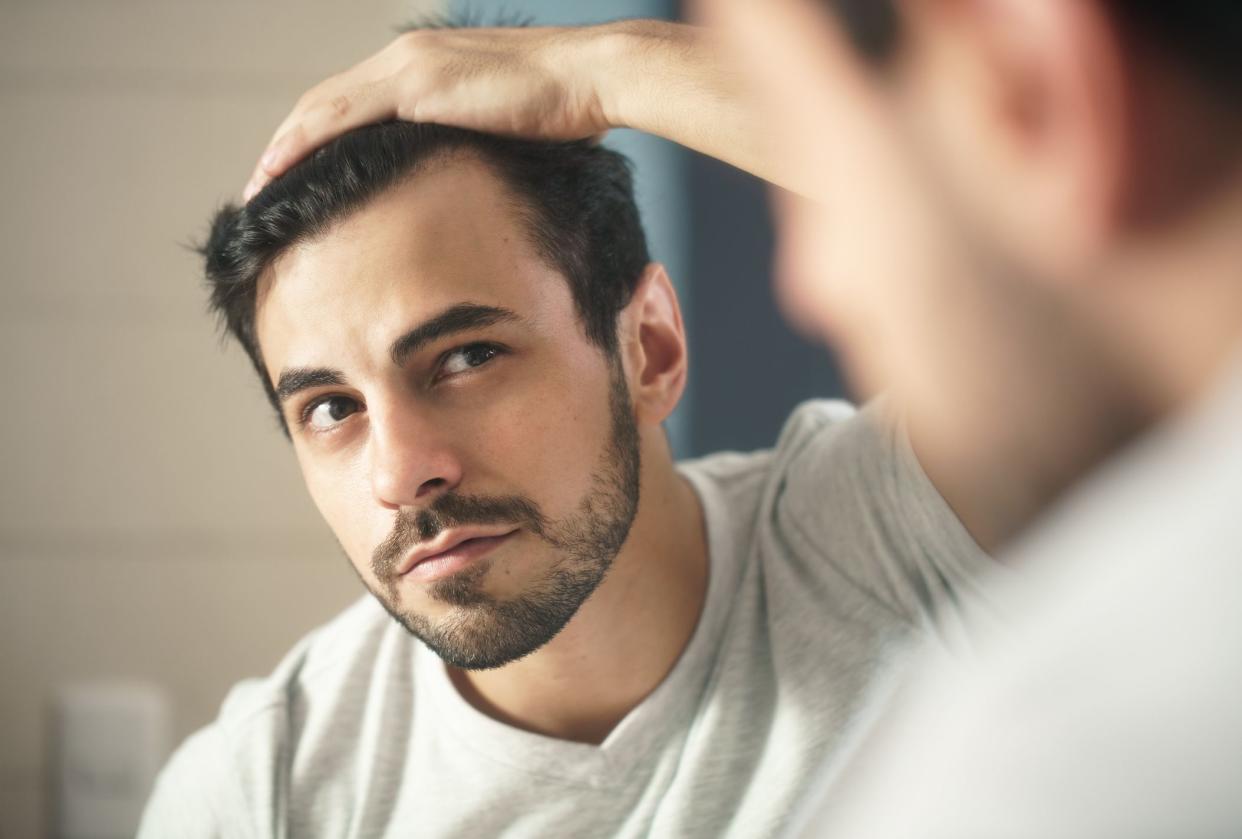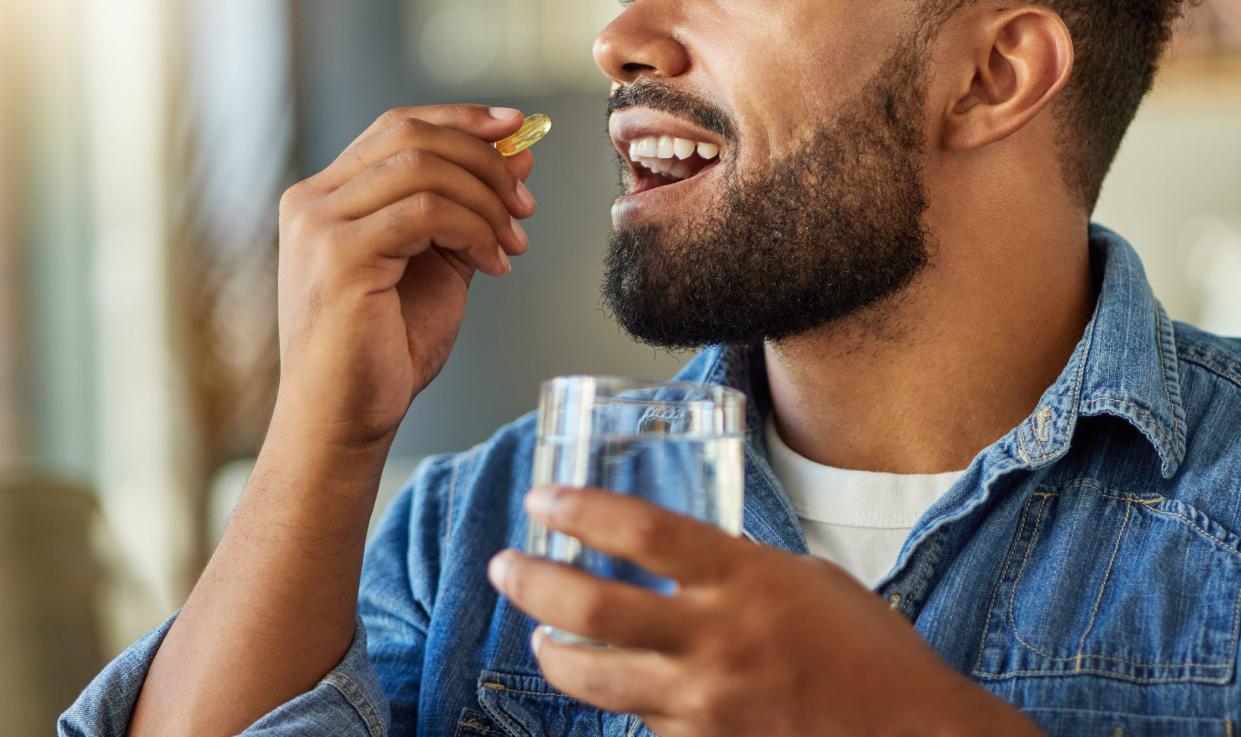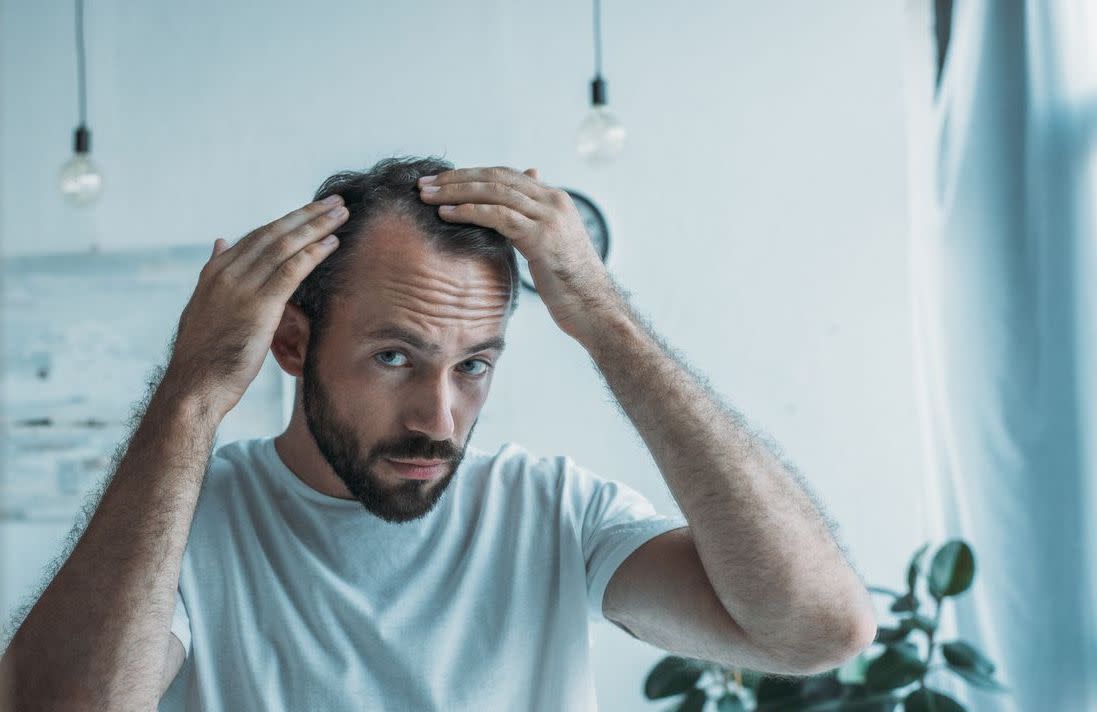Vitamin D Deficiency and Hair Loss: Is There a Connection?
This article was reviewed by Knox Beasley
If you’re experiencing increased hair fall, vitamin D deficiency hair loss could be to blame. Lacking vital nutrients like vitamin D can impact your overall health, leading to a number of issues — including hair thinning.
When your body doesn’t get enough of an essential nutrient, it doesn’t have the building blocks necessary to produce healthy strands. Nutritional deficiency can also be a physical stressor that impacts the hair growth cycle.
Below, we explain the vitamin D hair loss connection and the effect of insufficient vitamin D for hair growth, as well as possible hair loss treatments to explore..

Can Low Vitamin D Cause Hair Loss?
Although research is somewhat limited, there is evidence that lacking vitamin D can affect healthy hair growth, resulting in shedding, thinning, and patchy hair loss across the scalp.
One 2013 study involving women between the ages of 18 and 45 found that low levels of vitamin D2 were associated with two common types of hair loss: telogen effluvium and female pattern hair loss. Research has also linked vitamin D deficiency with male pattern hair loss.
Another 2014 study found a link between vitamin D deficiency and hair loss, specifically alopecia areata, a form of patchy hair loss resulting from an autoimmune condition.
That said, experts aren’t entirely sure what role vitamin D plays in the hair growth cycle. However, some research suggests that vitamin D receptors are important in the anagen phase of the hair growth cycle, which is when new hairs grow from the follicle to their full length. In other words, vitamin D may stimulate the hair follicles, which is key for hair follicle cycling.

Vitamin D: Key Info
Vitamin D is an essential, fat-soluble vitamin that plays a role in numerous biological processes. Specifically, vitamin D is responsible for:
-
Promoting calcium absorption
-
Ensuring healthy bone growth and remodeling
-
Modulating cell growth
-
Reducing inflammation
-
Maintaining a healthy immune system
Vitamin D also plays a key role in preventing certain diseases. People with low levels of vitamin D have a higher risk of developing rickets (in infants and young children) and osteomalacia, two diseases that can affect bone health and integrity.
And, as mentioned, there’s a link between low vitamin D levels and certain forms of hair loss.
While vitamin D is present in foods like milk and soy, it can be challenging to meet your daily vitamin D requirements with food alone. Most of your vitamin D is produced endogenously (by your body) through sun exposure.
Further, vitamin D is biologically inert. That means that to use vitamin D, your body needs to convert it using your liver and kidneys. This process, known as hydroxylation, is what allows your body to use vitamin D for various vital processes.

Symptoms of Vitamin D Deficiency
Many people with a vitamin D deficiency are asymptomatic. That means it’s possible to have low vitamin D levels and not know it.
If you have a severe vitamin D deficiency, however, you may notice some of the following symptoms:
-
Fatigue
-
Muscle weakness
-
Muscle aches and cramps
-
Bone pain or weakness
-
Slow healing of cuts and wounds
-
Changes in your mood (including depressed or anxious mood)
If you’re showing early signs of hair thinning and think you might be deficient in vitamin D, you should consider talking to a healthcare professional.
Healthcare professionals can diagnose vitamin D deficiency with a 25-hydroxy vitamin D blood test. This test checks for 25-hydroxyvitamin D, a common form of vitamin D that circulates in the blood.
The healthcare provider can also assess you for other possible causes of hair loss. For example, with male pattern baldness, a major contributor can be high levels of the androgen hormone DHT.

Risk Factors for Vitamin D Deficiency
You may have a higher risk of vitamin D deficiency if you:
-
Spend too little time outdoors in direct sunlight. Low sunlight exposure reduces your body’s ability to produce vitamin D naturally and is among the common causes of vitamin D deficiency.
-
Don’t get enough vitamin D from your diet. If you rarely eat foods that are high in vitamin D, you may have a higher risk of vitamin D deficiency.
-
Have dark skin. People with darker skin pigmentation produce less vitamin D naturally in response to sunlight. If you’re Black or Hispanic, you may have a higher risk of developing vitamin D deficiency than someone with a lighter complexion.
-
Are older. Older adults produce less vitamin D when exposed to sunlight. The kidneys also become less efficient at processing vitamin D as we age, meaning older adults are more likely to develop vitamin D deficiency.
-
Are obese. Body fat binds to vitamin D, preventing it from getting into the blood. In one 2015 study, researchers found that the prevalence of vitamin D deficiency is 35 percent higher in obese people compared to those in an ideal weight range.
-
Have ulcerative colitis, Crohn’s, or celiac disease. These medical conditions can affect how well you absorb certain nutrients like vitamin D.
-
Use certain medications. Some medications may interfere with vitamin D metabolism and absorption, including certain anti-seizure and antifungal drugs, steroids, cholestyramine, and certain HIV/AIDS medications.
-
Have had bariatric surgery. Having bariatric surgery can impact the absorption of vitamin D in your digestive tract, increasing the risk of vitamin D deficiency.
-
Have liver or kidney disease. Because the liver and kidneys are important for converting vitamin D to its active form, having chronic liver or kidney disease can increase your risk of a deficiency.

How to Treat Vitamin D Deficiency
So, you’ve been diagnosed with a vitamin D deficiency. What happens next?
Your healthcare provider will probably prescribe a vitamin D supplement. If you don’t get much vitamin D naturally, taking a dietary supplement like vitamin D3 may be helpful. Vitamin D supplements are inexpensive and widely available.
It’s also likely that your healthcare provider will recommend lifestyle changes as well. These include eating a balanced diet that includes foods that contain vitamin D, such as fatty fish and fortified milk or cereal, as well as spending more time in the sunlight.

Vitamin D and Hair Loss: Frequently Asked Questions
Is hair loss from vitamin D deficiency reversible?
If vitamin D deficiency is contributing to your hair loss, it’s possible that increasing your vitamin D intake may help. However, research into the use of vitamin D to treat hair loss is limited. One 2021 study found that oral vitamin D3 supplements improved a type of hair loss called telogen effluvium. Meanwhile, a 2022 study found that oral vitamin D in combination with minoxidil helped with female pattern hair loss.
How much vitamin D should you take for hair loss?
According to NIH’s Office of Dietary Supplements, the recommended dietary allowance for vitamin D is 600 IU daily for adults aged 18 to 70. For adults over the age of 70, it’s 800 IU daily. If your doctor recommends a vitamin D supplement for hair loss, they’ll let you know how much to take each day.

What happens if you get too much vitamin D?
Getting too much vitamin D can lead to vitamin D toxicity. This is a potentially harmful condition that can cause nausea, vomiting, constipation, weakness, weight loss, reduced appetite, heart rhythm problems, and kidney damage.
Note that you can’t overdose on vitamin D from getting too much sunlight, but overdoing it on vitamin D supplements can lead to toxicity. To avoid vitamin D toxicity, only use vitamin D supplements as recommended by a healthcare professional.
What foods are rich in vitamin D?
Fatty fish (think tuna, salmon, and mackerel), cheese, egg yolks, mushrooms, and beef liver are great natural sources of vitamin D. Fortified foods like milk, yogurt, breakfast cereals, and orange juices may also contain added vitamin D.

How much sun time is needed to make vitamin D?
Your body produces its own vitamin D naturally when your skin is exposed to UV rays from sunlight. While spending too much time in direct sunlight isn’t good for your skin, a small dose of sun exposure (up to 30 minutes per day) is crucial to producing natural vitamin D. Just don’t forget to wear sunscreen!
Are other vitamin and mineral deficiencies associated with hair loss?
In addition to vitamin D, other nutrient deficiencies can also lead to hair loss. Some examples include iron deficiency, zinc deficiency, and low levels of B vitamins like vitamin B12, biotin, and folate.
How common is vitamin D deficiency?
Vitamin D deficiency is one of the most common nutrient deficiencies. Up to one billion people worldwide — approximately 13 percent of the world’s population — are deficient in vitamin D. Further, an estimated 50% of people around the world have insufficient levels of vitamin D.

Vitamin D for Hair Growth: The Bottom Line
Talk to your healthcare provider if you’ve noticed hair shedding or a thinning hairline and think you could be experiencing vitamin D deficiency hair loss. They can give you medical advice to help guide you in the right direction. Here’s what you can expect:
-
Your healthcare provider may recommend a blood test to check your vitamin D levels. If you do have a deficiency, they’ll recommend natural ways to get more vitamin D as well as supplements you can use.
-
If a vitamin D deficiency is ruled out, remember there are plenty of things that can cause hair loss. And there are different types of hair loss, too, like male pattern baldness (also known as androgenetic alopecia) and telogen effluvium.
-
If you’re experiencing vitamin D-related hair loss, your healthcare provider also may recommend one of several science-backed hair loss treatment options, like finasteride and minoxidil. These medications can help slow down or stop hair loss, and some might even promote hair regrowth in areas where your hair has started to thin.
-
Your doctor may also recommend lifestyle changes to ensure you’re getting adequate vitamin D. This could include getting some healthy sun exposure and making certain dietary changes for hair growth.
If you’re experiencing hair loss and don’t have a deficiency, medication still may be the logical next step. As mentioned, finasteride and minoxidil are the two of the main hair loss treatments, though they come in a number of forms.
And of course, there are also supplements you can take to promote overall hair health.
Talking to a healthcare provider such as a dermatologist is a great first step in determining what’s causing your hair loss and which hair loss treatments may be right for you.
-
Related: The Hair Growth Cycle: 4 Stages Explained
-
Related: The Best Haircuts for Men with Thin Hair
This article originally appeared on Hims.com and was syndicated by MediaFeed.org






